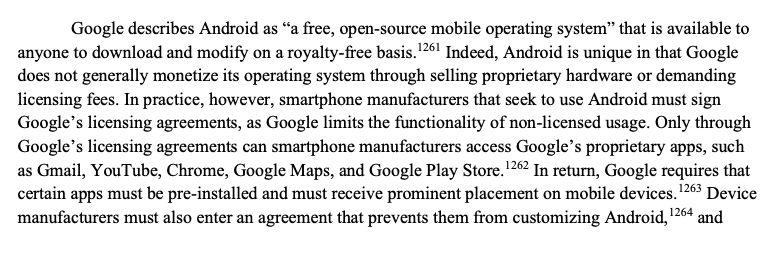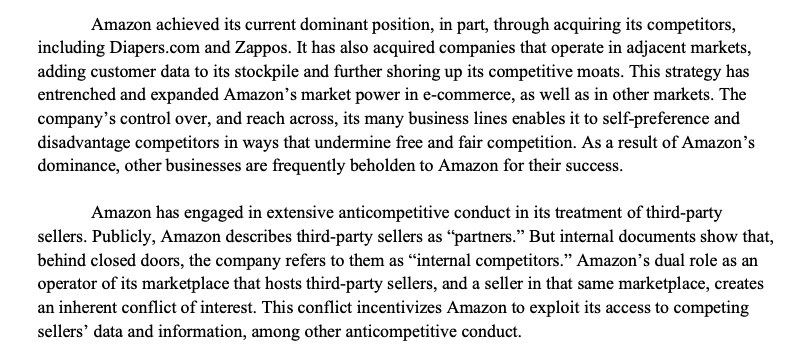I& #39;m kind of relieved by the House Judiciary Committee antitrust report. The recommendations are bad, as expected, but it& #39;s just a mess.
It& #39;s the world& #39;s longest green ink letter, written as if almost every *single* thing Google, Amazon, Apple & Facebook do is anticompetitive.
It& #39;s the world& #39;s longest green ink letter, written as if almost every *single* thing Google, Amazon, Apple & Facebook do is anticompetitive.
Here& #39;s one of the main accusations against Facebook in the Exec Summary: that AFTER it had merged with Instagram (and that deal had been cleared) it instructed Instagram to not "compete internally" with its core product. So FB& #39;s crime here is "collusion".... inside its own firm.
Of course you can object to Facebook/Instagram being cleared. But *once it had been cleared*, objecting to a business running itself as "an internal monopoly" and directing different products to target different customer groups really seems misguided on a fundamental level.
Here& #39;s how it describes the Android contracts. If as well as the (free) OS you want Gmail, YouTube, Chrome, Google Maps, and Google Play Store (for free) you have to agree to install Google Search too. Doesn& #39;t even mention that this is how Google profits from Android at all.
The report sees all of these as basically the product of monopoly. It ignores that users usually have to download Chrome manually, or that iOS users *hated* Apple Maps being forced on them. Even the Cloud section has some half-assed attempts to portray it as anticompetitive.
Here& #39;s an important throwaway remark – as if the significant thing about smartwatches, drones, driverless cars, etc is *surveillance*.
Whoever wrote this cannot conceive of new technology as anything other than harmful and dangerous.
Whoever wrote this cannot conceive of new technology as anything other than harmful and dangerous.
Is online retail a distinct market from offline retail? For some things, maybe, but I certainly wouldn& #39;t buy a lot of what I get from Amazon if it was cheaper at the local shop – if others are like me, then they& #39;re not distinct markets.
Obviously the report doesn& #39;t care about technicalities like that. But if you care about competition you should! Who Amazon& #39;s competitors are – whether it& #39;s Walmart, or "just" http://Walmart.com"> http://Walmart.com – matters a lot to whether we think Amazon can raise its prices uncompetitively.
It& #39;s completely true that Amazon (and all platforms) face conflicting incentives that they have to balance against each other, like balancing returns to suppliers vs lowering prices for consumers. This is a fundamental part of platform economics, not something unique to Amazon.
I wrote about the conflicting incentives Amazon faces with its own-label brands. IMO this report misses the interesting questions, and instead ends up being worried about "too much competition" driving inefficient suppliers out of business. https://truthonthemarket.com/2020/04/27/amazons-tightrope-balancing-innovation-and-competition-on-amazons-marketplace/">https://truthonthemarket.com/2020/04/2...
As an aside: this is completely bananas. AWS is bad, because Amazon& #39;s competitors use it instead of Azure or Google Cloud, etc, and they are "forced to consider patronizing a competitor"? What? It is barely coherent.
Another revealing bit: "Apple& #39;s market power is durable due to ... brand loyalty". Brand loyalty reflects the (perceived) quality of the product offering. It& #39;s equivalent to saying "Apple has market power because it makes smartphones people really like".
Throughout, the model is that competition is about forcing as much open entry on every possible dimension as possible, instead of considering *why* the relatively closed platform, iOS, is so much more high value than the relatively open one, Android (eg https://truthonthemarket.com/2020/07/07/on-the-origin-of-platforms-an-evolutionary-perspective/).">https://truthonthemarket.com/2020/07/0...
So, I& #39;m with Neil. There& #39;s no attempt to understand a really, *really* important sector of the economy – it& #39;s just a very long and very shallow attempt to paint every single thing big tech co& #39;s have done in the worst light possible. https://twitter.com/neil_chilson/status/1313590659245314050">https://twitter.com/neil_chil...
Ah I almost forgot to post the link – here it is. Enjoy! https://judiciary.house.gov/uploadedfiles/investigation_of_competition_in_digital_markets_majority_staff_report_and_recommendations.pdf">https://judiciary.house.gov/uploadedf...

 Read on Twitter
Read on Twitter










